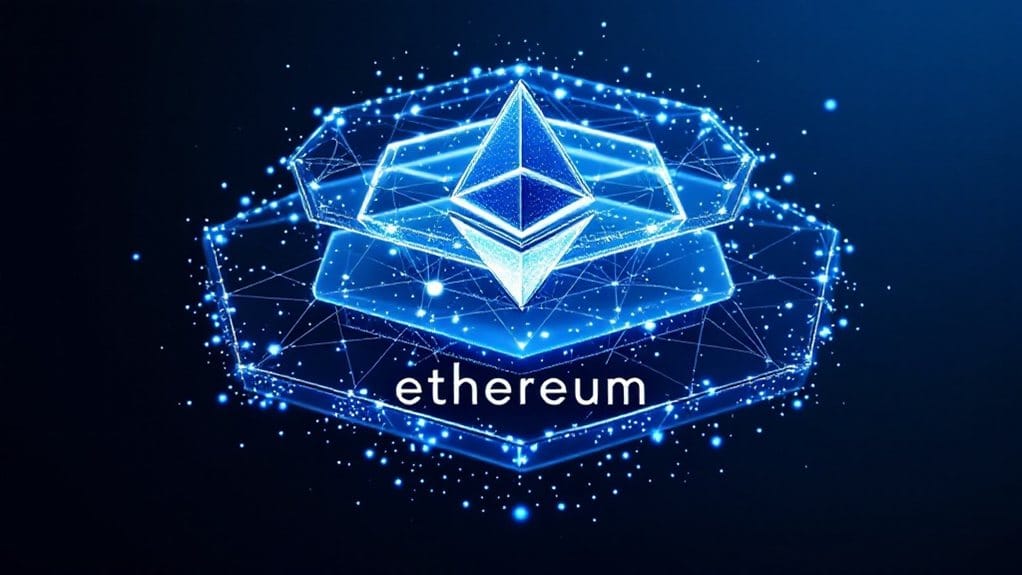Audius disrupts traditional music distribution by leveraging blockchain technology to create a decentralized streaming platform where artists retain up to 90% of revenue. Operating on Ethereum and Solana networks, the platform eliminates intermediaries through smart contracts that automate royalty payments while using IPFS for secure file storage. With 4 million monthly users, Audius employs a DAO governance structure where token holders participate in platform decisions, establishing a new paradigm for artist-listener relationships in digital music distribution. This innovative model reveals the transformative potential of decentralized technologies in restructuring creative industries.

As the music industry continues to evolve in the digital age, Audius has emerged as a groundbreaking blockchain-based platform that fundamentally reshapes how artists distribute and monetize their music. Operating on the Ethereum network with partial migration to Solana for improved scalability, Audius utilizes blockchain technology to create a transparent system where artists maintain direct control over their content distribution and revenue streams. The platform offers artists a way to independently release music directly to their audience. Since its launch in 2019, the platform has attracted 4 million monthly users.
The platform’s infrastructure combines Proof of Stake consensus with the Tendermint protocol, while utilizing IPFS for decentralized music file storage, guaranteeing both security and accessibility. Through its peer-to-peer network architecture, Audius greatly reduces central storage requirements while maintaining high-quality streaming capabilities for users, all without requiring subscription fees. Similar to how self-directed IRAs allow investors more control over their assets, Audius gives artists complete autonomy over their music distribution.
Audius revolutionizes music streaming through decentralized storage and peer-to-peer technology, delivering high-quality content without costly infrastructure or user fees.
Artists on Audius retain up to 90% of their revenue, a stark contrast to traditional streaming platforms, while maintaining complete ownership of their work through blockchain-verified records. The platform’s smart contracts automate royalty distributions, eliminating the need for intermediaries and assuring transparent, immediate compensation for creators.
Artists can further monetize their content through social tokens, offering exclusive access to dedicated fans and creating new revenue streams.
The platform’s governance structure operates under a DAO framework, where AUDIO token holders participate in decision-making processes that shape the platform’s future development. This democratic approach to platform management guarantees that both artists and listeners have a voice in protocol upgrades and feature implementations, fostering a truly community-driven ecosystem.
Audius’s impact extends beyond artists to music consumers, who benefit from direct access to creators, exclusive content, and community engagement opportunities. The platform’s node operators contribute to network stability, while curated playlists and engagement tools create an interactive environment for music exploration.
FAQs
How Do Artists Receive Payment for Their Music on Audius?
Artists receive payments through a blockchain-based system that processes transactions in USDC stablecoin, which is pegged to the US dollar.
The platform enables direct fan-to-artist payments via credit cards, with artists receiving up to 90% of revenue in real-time.
Through blockchain integration, the payment process eliminates intermediaries, while 10% of transactions are allocated to the community treasury for platform governance and development.
What Are the Technical Requirements for Uploading Music to Audius?
The technical requirements for uploading music include support for multiple audio formats such as FLAC, WAV, MP3, MP4, and M4A, with files needing to meet the platform’s quality standards of 320kbps streaming at 48kHz sample rate.
Artists must guarantee their audio files are properly formatted, while the platform handles file conversion and optimization through IPFS storage protocols, maintaining high fidelity across the decentralized network.
Can Listeners Download Songs From Audius for Offline Playback?
Listeners can download songs from Audius exclusively through the platform’s mobile app for offline playback.
While direct MP3 downloads are limited, users can access offline listening features by toggling download options on playlists, albums, or favorite tracks within the application.
The downloaded content remains stored in the app’s ecosystem, allowing playback without an internet connection, though availability depends on individual artists enabling download permissions.
How Does Audius Handle Copyright Infringement and Content Ownership Disputes?
Audius employs a robust three-strike system for copyright enforcement, removing infringing content upon receipt of DMCA takedown notices.
Users must own both composition and sound recording rights or obtain explicit permission before uploading.
The platform accepts formal complaints via [email protected], while content removal disputes can be addressed through [email protected].
The decentralized nature of content storage on IPFS requires coordination with multiple Content Node operators for effective takedowns.
What Blockchain Network Does Audius Use to Store Music Data?
Audius employs a hybrid blockchain architecture, utilizing both Ethereum and Solana networks.
While Ethereum manages smart contracts, governance, and token economics, Solana handles high-throughput operations related to content streaming.
The actual music files are stored on IPFS (InterPlanetary File System), a decentralized storage protocol, while metadata and ownership information are recorded on the blockchain.
This multi-chain approach optimizes performance while maintaining decentralization.









